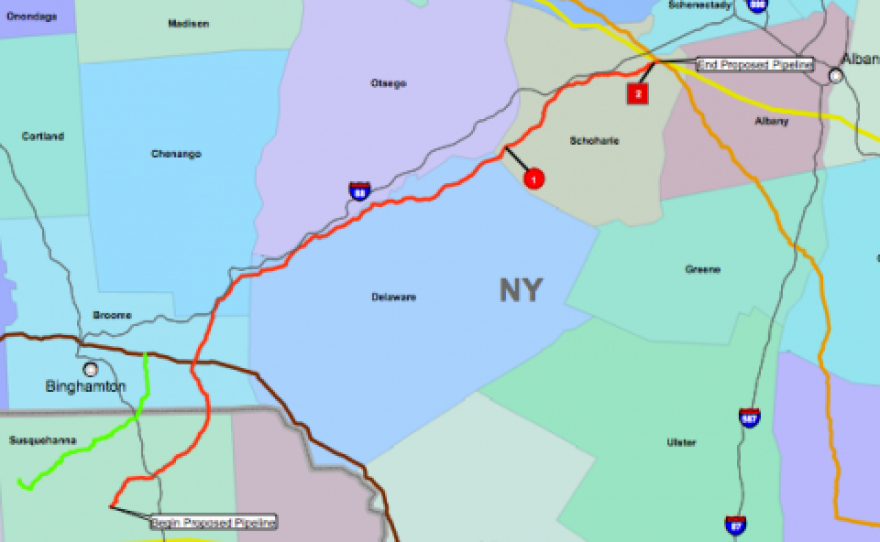The 124-mile Constitution Pipeline would carry natural gas from Pennsylvania's shale fields through New York’s Southern Tier and into Schoharie County, connecting with a network of other pipelines. By now, had things gone according to plan, natural gas would be flowing through it. But, public opposition and regulatory red tape have dogged the $680 million project.
Constitution Pipeline company spokesman Chris Stockton says since day one the company has worked very closely with the state Department of Environmental Conservation to set the project in motion. "We received our FERC certificate back in December of 2014. They looked at this project and ultimately determined that this project was important, it was needed, and it could be done in an environmentally sensitive area."
Construction was to have begun in late spring of 2015 and was expected to be completed by the summer of 2016. But by November of 2015, DEC had not acted on essential water quality permits, and gave no timeline as to when a decision would be made.
Environmental groups have been against granting the permits. They fear the pipeline would threaten public health and open the door to toxic emissions and water pollution, not to mention the possibility of explosions. They argue the project would impact 277 waterways, 1,000 acres of forest and farmland and 700,000 trees.
Federal regulators in January rejected Constitution's request to cut trees in New York along the proposed pipeline route. Stockton says the "environmental window" for that to happen has closed for the season. "It will open back up again next fall. So, pending the receipts of the necessary permits we can begin the tree felling work in the fall."
Last summer, Colleen McKinney trekked to the state capitol to participate in one of many pipeline protests. She explained that Delaware County home is next to land seized through eminent domain for the Constitution Pipeline. "Not for the public good, not for the benefit of America, but to increase the profits of rich private gas corporations and their shareholders."
Stockton, pointing out that New York gets 97 percent of its natural gas from other states, says the benefit is obvious: "Currently New York doesn't have access, direct access, to Pennsylvania gas, which is the cheapest in the country, so this project is going to facilitate for the first time direct access to the largest and one of the most economically priced natural gas supply areas in the country."
McKinney and other opponents contend no one in Pennsylvania, New York or New England will benefit from the fracked natural gas it would carry, since it will be going to Canada via the Iroquois Pipeline. "This gas is not for us. These companies want to export it because natural gas prices in the rest of the world are much higher than they are here. Profit is their only concern."
Stockton disagrees. "This infrastructure is very important. Very important for the region, and also for New York, which doesn't have gas access now. And this pipeline is gonna facilitate local gas service to homes and businesses in the Southern Tier, which right now are desperate for it. They want it very badly because they need some type of economic stimulus in that area."
He says construction of the Constitution Pipeline will likely directly and indirectly support more than 2,400 jobs and generate $130 million in labor income for the region along its pathway.
The DEC answered a request for comment by email, stating in part "...the project must still obtain necessary permits from the U.S. Army Corps of Engineers and DEC before project construction can begin. DEC is undertaking a careful and thorough review of the necessary state permit applications as required by our protective regulatory programs. As with all complex proposals that impact a large portion of the state, DEC works with state and federal agencies and other stakeholders to fully understand the potential impacts and make our decisions based on sound science. DEC considers all public comments received as part of our review process."
A conclusion is expected in April.










